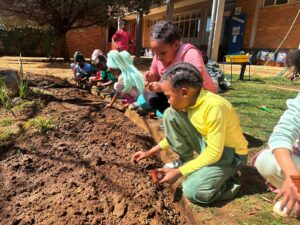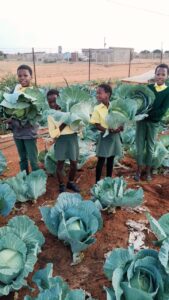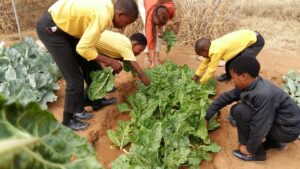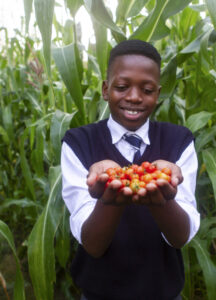Press release
The EduPlant Programme, South Africa’s longest-running school greening and food security initiative, continues to transform learning environments across the nation.
The 2024/25 cycle of this flagship programme, delivered by Food & Trees for Africa (FTFA) in partnership with Tiger Brands, is making remarkable strides in enhancing sustainable agriculture through school curricula, with far-reaching academic, social, and ecological benefits.
The programme, which engages schools in creating edible gardens, has demonstrated a profound cross-curricular impact. By integrating vegetable and plant production with subjects such as Natural Science, Geography, Mathematics, and Language, EduPlant has become a living classroom. Bharathi Tugh, EduPlant Manager & Education Associate at FTFA, explains:
“One of the important principles of permaculture that we foster is; ‘integrate rather than segregate.’ Our workshop content is taught in a sensitive and holistic way, linking various subjects. This approach has yielded multiple benefits and has a deep impact on both learners and teachers. It’s beautiful to watch this unfold across South African school each year.”

Cross-Curricular Integration in Action
EduPlant’s workshops have been carefully designed over the last 30 years, to align with evolving needs in under-resourced communities and their school outcomes. Practical garden sessions alongside Annual Teaching Plans (ATPs), enable educators to incorporate gardening into their lessons. The programme has driven success in multiple learning areas.
- Natural Science: Learners gain greater scientific knowledge and understanding on topics such as plant life cycles, soil chemistry, healthy bodies and sustainable agricultural practices.
- Mathematics: Practical activities like measuring garden plots or tracking harvests enhance numeracy skills.
- Language: Activities such as creative poetry writing and recitation, inspired by climate change themes, broaden vocabulary and boost communication skills.
- Geography and Social Science: Students monitor seasonal changes and extreme weather patterns, fostering awareness of the planet’s needs.
- Life Orientation: Through food production and entrepreneurial activities, learners develop skills for economic self-sufficiency.
- Life Skills: The programme nurtures confidence, resilience, self-esteem, and responsibility through roles like managing garden maintenance schedules and sales records.


Centres of Excellence: A Hub of Inspiration
EduPlant’s Centres of Excellence (CoEs) serve as role models for mentee schools, demonstrating the tangible benefits of sustainable gardening. These schools lead by example, showcasing permaculture practices that are integrated into every aspect of the curriculum. Mentee schools, in turn, receive mentorship and resources, accelerating their own journey toward becoming self-sustaining hubs of education and food security.
Feedback from facilitators, educators, and parents highlights the success of this model. CoEs not only excel in academic performance but also act as catalysts for community engagement, bringing parents and local stakeholders into the fold. This engagement enriches the schools and reinforces the importance of sustainable development practices.
“We are immensely proud of the remarkable progress made by our new EduPlant schools. Their dedication to learning from the programme and applying their newfound knowledge will have a profound impact on countless lives at school and in their communities. By taking these crucial first steps, they are not only working to meet their own nutritional needs sustainably, but also tackling the critical challenge of hunger in our country,” Preeya Naidu, Social Transformation Manager, Tiger Brands.


Transforming Lives Beyond the Classroom
EduPlant’s impact extends far beyond academics. Learners develop fine motor skills through hands-on gardening, adopt positive attitudes toward healthy eating, and experience improvements in emotional well-being. The sense of responsibility fostered by tending to gardens translates into a more positive school culture.
Educators, too, benefit from the programme, receiving professional development in permaculture practices. This equips them with tools to inspire a generation of learners committed to environmental stewardship and self-reliance.
A Growing Legacy
As EduPlant continues its journey, the programme remains committed to creating a generation of learners who understand the importance of sustainability. By deepening its impact and emphasising cross-curricular integration, EduPlant is nurturing not only gardens but also minds, communities, and ecosystems.
Photos supplied.
***
Relevant Agribook pages include “Permaculture” and “Agricultural education and training“.
